5-1-24
When Life Hits the Screen:
Excursion and Only When I Laugh at SEEfest
By Diane Sippl
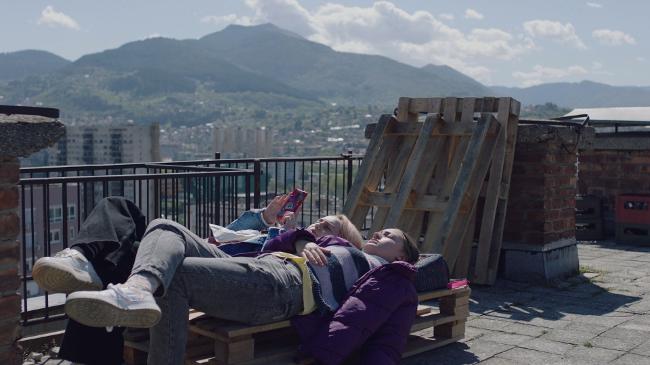
The Stories Behind the Story
Really, whether it’s there or here, then or now, violence against women is more like one story. Whether physically manifested or judicially upheld or economically instituted or socially practiced or culturally inherited, the subjugation and repression of women continues to be violently effected. Today there will be those who disagree. Let them look at two films presented at this year’s South East European Film Festival Los Angeles, often called just SEEfest, and see for themselves.
From May 1st to May 9th at a variety of venues throughout the city, the festival is screening a number of cinematic works drawn directly from life, starting with its Opening Gala, Guardians of the Formula, addressing conflicts from the original round of the Cold War (in this case, relations between France and Tito’s Yugoslavia), and continuing to its Mid-Festival Gala, Libertate, depicting the chaos of civil war in Romania’s revolution against the Ceaușescu regime. Given the invasion of Ukraine today and the civil unrest reacting to attacks on Palestine (including in the backyard of the fest’s screenings at UCLA, in fact), the events on the screen are chilling to watch. These two films are fairly male-centered, but the anxiety isn’t dissipated in the least with two features focused on women—a coming-of-age tale and a domestic drama.
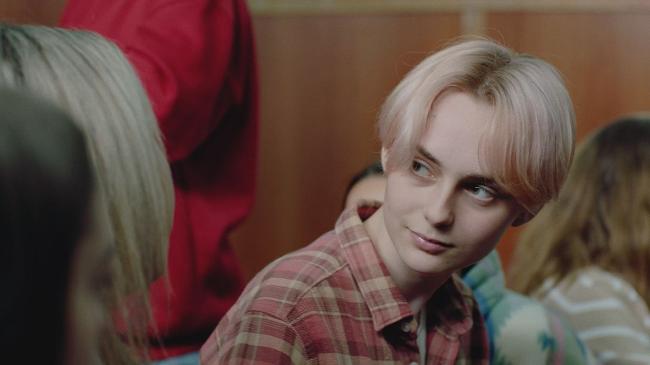
Two women filmmakers who opt for the approach and effects of cinematic realism today may employ it through separate means but they start from similar places—not just the bordering countries of Croatia and Bosnia and Herzegovina, but the spaces of media headlines, be they verbal reports in news outlets or videotaped images on social media, but nonetheless mass broadcasts of “scandals” involving women today that have also led to mass outrage and publicly vented reactions.
Each in her own way, neither Una Gunjak from Sarajevo nor Vanja Juranić from Zagreb is interested in simply unpacking and representing the shocking events; instead these women are drawn to particular facets of the societal alarm itself and to the deeper foundations that allow such behaviors to arise. The protagonists in their films are some years apart; Gunjak’s characters are high-school girls, and the lead for Juranić is already a mother of a six-year-old child.
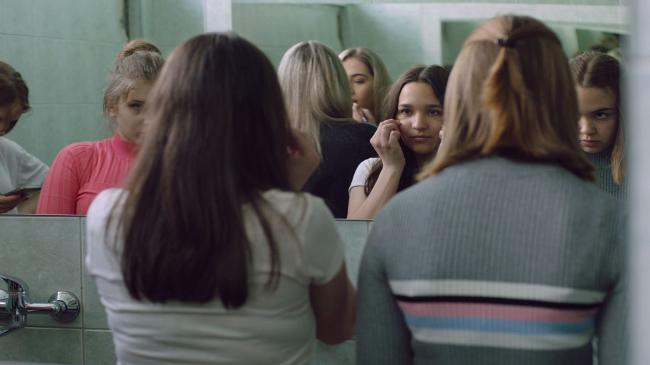
How Realism Digests Events
Filmmaker Una Gunjak woke up one morning in 2014 to the headlines that, of 14 girls graduating from middle school and celebrating it with a brief summer vacation trip, 7 returned home pregnant. How could this be? But that’s not the questioned she asked herself. She was more astounded by the public reaction, the mushrooming of a hate campaign against the girls on every front, in all media at-hand, branding them as “sluts,” “degenerates,” “fallen sinners.” For Gunjak, the rumor and its wildfire that spread far and beyond Sarajevo were the fodder for a film, her first feature after a highly successful series of shorts. Someone needed to sift through the fallout and locate the violence in the social structure itself, from top to bottom. She herself would take on this project in her film, Excursion.
Let’s start with the central character. Her classmates call 15-year-old Iman a “nerd.” Indeed, she is bright, and clever enough to get high scores on both her own and her best friend’s classroom quizzes. Yet Hannah seems to be her only real friend, because the other girls are soon alienated from her once she begins to claim an “inappropriate” level of expertise in sexual behavior. In fact, this athletic, slim-as-a-broomstick, pretty young teen likes to look a bit special—bleached-blonde hair and spiky navy-blue goth fingernails—and doesn’t mind surprising her cohort. On a crowded bus, she sits on top of Hannah and clowns around with a hint of an improvised lap dance. Cut it out, Hannah insists, as she did earlier when Iman kissed her on the cheek in a moment of joy. “Save your kisses for him,” she retorts to Iman.
But at this point, that boy apparently wants nothing to do with her, despite the fact that rumors are circulating that he slept with her, vague details that an acquaintance tells Iman were leaked by another girl, seemingly the new “conquest” for the boy according to Iman’s eavesdropping at his apartment door. Nonetheless, even though he didn’t sleep with Iman, “he must have wanted to,” she tells herself. He must have feelings for her, she tells Hannah, or he wouldn’t have started the rumor he did.
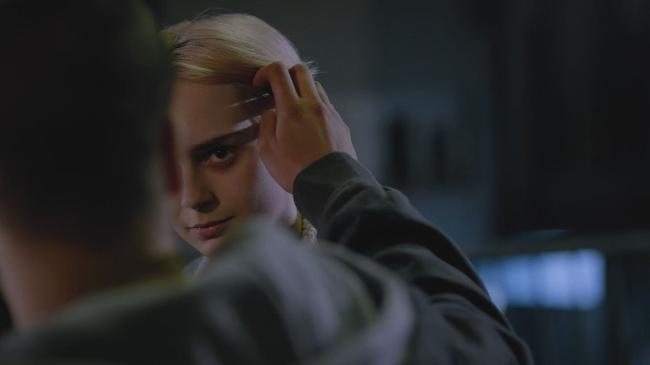
For all her highly-charged, half-baked knowledge of sex, Iman is as socially naïve as any other middle school girl, stuck between childhood and adulthood and seriously confronting the changes in her body. All the girls have questions they’ve never dared to speak aloud (despite their participation in the Truth or Dare games with each other and even those led by their male classroom teacher, who seems to be fond of stroking the girls’ hair). But the school claims that it has no authority to offer sex education classes, even in preparation for the end-of-school travel trip, hopefully from their homes in Sarajevo to Venice, which is in the works, if the students could “behave” themselves, especially because when the Banja Luca girls took their vacation trip, 7 of the 13 who went returned home pregnant. That’s quite astonishing for one week of travel, but that was the rumor, anyway, and it was the basis of a huge scandal in the press and social media—a scandal that causes too much trepidation once it is rumored that their own Iman is pregnant just as it’s time to graduate. Is it true? Here’s the thing: she planted the rumor herself, vomiting on the playground with an eager audience.
No worries, Iman tells herself: it can all be easily handled. She can spread the news that her pregnancy test was negative, or that she had an abortion. In fact, the school requires a blood test from her. But all this is beside the point. She’s censured anyway—asked to remain absent by her Religion class teacher, even though he won’t fault her for not attending, and ultimately pressured to transfer to another school “for the well-being of the students and their end-of-year study schedule and activities.”
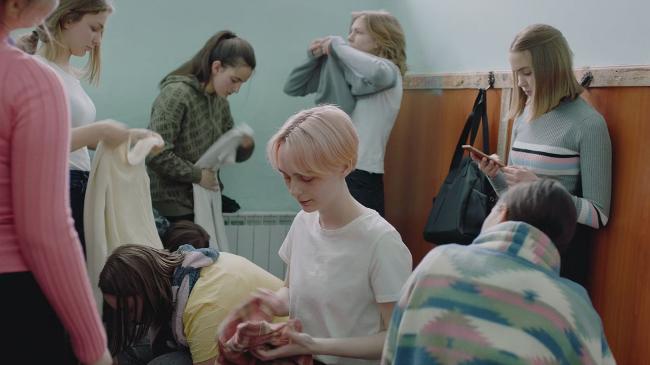
And for the filmmaker, this is exactly the point: the parents’, the school’s, the community’s reactions—not even to Iman’s behavior or non-behavior, nor to the shame the institutions should feel for shunning the responsibility of educating and protecting their young co-eds—but to the public scandal itself, rumor that it most likely is. Una Gunjak doesn’t pointedly ask how such rumors get started, but we do, and we find our answers in the meticulously delineated daily lives of the students, including Iman herself.
A boy in the crowd reacts to her “predicament” shouting, “No boy will want you now.” A girl replies, “You’d be the first in line.” Earlier Iman’s own younger brother sasses, “Are you on the rag?” In class a male teacher demands a cell phone from one of the boys and opens it—“Let’s see what you’ve been doing under the desk.” Bits of social “manners” trickle through the dialogue, but the most interesting are the girls’ voiced fantasy’s and attitudes regarding sex in query of Iman: “Did it hurt? For how long? Did you pass out? Did you bleed? Weren’t you afraid—of him, of what might happen to you, of what people would think?” They’re shocked to hear Iman say there was no force, no discomfort, no fear, no regret. And that’s enough for them all to make a pariah of her.
In fact, Iman answers their questions graciously and wisely, offering kind and sensible responses. She is loving to her blind grand-dad, and she is genuine with her mother (herself a health worker), never lying to her and feeling very sad that she caused so much trouble. Iman is up-front with her crush, who brushes her off from beginning to end. Why does she uphold his lie that they “had sex,” and then create another that she’s pregnant? Is it a plea for his acceptance, a sad kind of flirtation, a ploy for attention (a style her teacher loudly attributes to her in class), a wish for respect and envy from her female peers, or the spontaneous experiment of a rebel who wants to rock the boat of patriarchy and conformity?
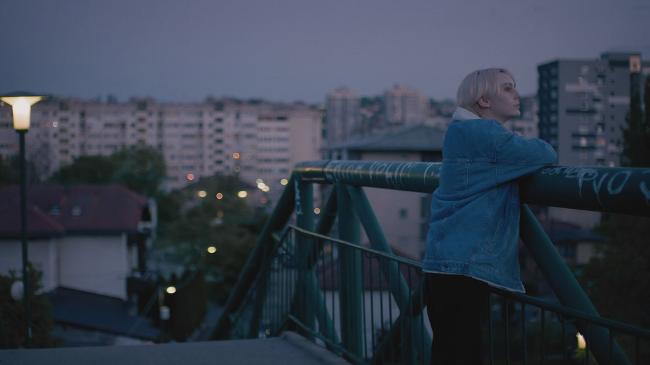
The filmmaker, in a style of social realism that gives us a fly-on-the-wall perspective, provides numerous dialogues of entire ensembles—the girls in the locker room, the mixed-group teens on the street, the parents and teachers at the school—that let us observe the crowd-sourcing of ideology that reigns in the city, in fact a city that is clearly Sarajevo from the hills that we see with a rooftop gaze, but could be any town given the loneliness shared by the two adolescent girls, Iman and Hannah, as they take refuge above and away from everyone to seek solidarity with each other. The bedroom in Iman’s apartment is like an isolated sanctuary in the galaxy, its wallpaper a vast sky of remote stars in the night where she and her brother retreat to their shared laptop to join the universe.
Outdoors, the street walls are covered with graffiti in a sector of the city with block towers for housing and less-than-prestigious schools. The music is the diegetic sounds of a TV youth talent contest or Iman and Hannah singing on their way home, echoed in another song in the end credits by a solo female voice. The documentary “you-are-there” style of the film is most of all executed by frequent close-ups, especially of the girls and Iman, that draw us right inside their thoughts and worries, their self-conscious appearances and unconscious mirroring of the society, all the while we discover what an intrepid, self-willed 15-year-old girl like Iman is up against in Sarajevo today.
Gunjak relies on the vital input of the schoolgirls themselves, first-time actors who contributed more than their thespian talent, including the phrasing of their lines and sometimes even the ideas that should be discussed, the attitudes they hold, and the way they see their lives. This level of improvisation in rehearsals yielded an authentic and urgently relevant showcase of teen mores, youths caught in the contradictions of “growing up sexy” and refraining from sex all the while their bodies are cramped into one-size-fits-all social posturing, their minds are torn between obedience and curiosity, and their hearts are easily crushed by “failure to fit in.” Asja Zara Lagumdžija is stellar in her forthright performance of a young woman unafraid to test others just as she does herself, constantly shoring up social platitudes just as she researches novel sexual practices and spews them out to her classmates for shock effect. Her Iman is a pioneer and a casualty at once. We’ve all known such aspirants to non-conformity; they are alive and well as our scapegoats.

In Another Country, Too Close to Home
About midway through Vanja Juranić’s third feature film, a friend asks Tina if the cuts and bruises on her body hurt. “Only when I laugh,” she replies, perhaps the most ironic line in a film that earns exactly that phrase as its title. The filmmaker was spurred to create her shattering drama for the screen by an event from 20 years earlier that never ceased to haunt her: a woman in Croatia, Ana Magaš, was imprisoned for killing her husband in self-defense after years of subjection to his violent physical abuse. That’s not all—there’s a related addendum, perhaps more appalling, especially in the way it was received. But we’ll come back to that, because it takes us right up to the present. In the meantime, Juranić made Only When I Laugh, one of the most candid and sobering screen treatments of domestic violence in recent years, one that uncannily belies its genre label as a “thriller.”
Just as Una Gunjak does in Excursion, Vanja Juranić takes us behind the scenes—here, from the family dinner table to the ladies’ Kaffeeklatsch to the couples’ cocktail hour to the disco party to the priest’s confessional—to see what is left unsaid in the society, socially forbidden and morally inconsequential speech, due to a patriarchal system so deep-seated it’s taken for granted. Elegant, mild-mannered Tina is married to strapping, self-entitled Frane, and while they make a handsome pair in their comfortable home with their obedient grade-school daughter Mara, Tina becomes restless to return to her unfinished college degree in Psychology. She put it on-hold when she got married, but the agreement was for her to complete it one day. Frane does his best to prove that Tina’s place is in the home, serving his needs.
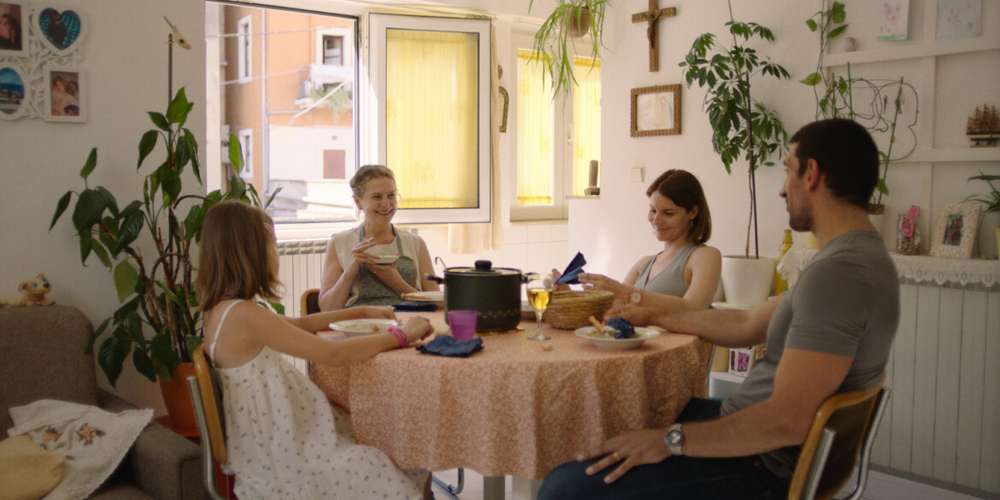
Is it a modern-day Doll’s House? Hardly. Frane starts by sabotaging Tina’s studies, tossing out the notebooks she has borrowed from a helpful classmate. He throws fits claiming “household neglect” when the cooking or cleaning isn’t to his liking. He dons fresh clothes and cologne as he dashes out the door at night “to watch the game with the boys,” yet his own suspicions rise exponentially when Tina asks ahead of time for a night out to celebrate a girlfriend’s birthday. He invades their innocent dance party with a mighty vengeance and assaults her violently and publicly. Who will rescue her?
It’s not the first time. Girlfriends encourage Tina to leave him, but her mother counsels her to “have patience.” And Frane, of course, embraces her in bed, weeping apologies like a baby, as if to confirm to Tina that her mother was right. But even Mara, little girl that she is, vocalizes to her mother, “He’s stronger than you.”
For that matter, Tina has recurring nightmares that she needs to frantically rescue Mara and flee. These are inventively intercut into the film not as flashbacks but as flashes forward—Tina’s stream-of-consciousness point of view—as if she knows enough psychology to self-diagnose her own “pathology,” not one of murderous criminal violence but one of fear, avoidance, self-denial, and the delusions of a woman subjugated under patriarchy. These abrupt, abrasive, aberrant scenes yank us out of the everyday domestic and collegiate narrative and put us on edge. And since they lace the film together from beginning to end, we have no doubts as to what will happen, so “thriller” is not quite the label to apply to Only When I Laugh.”
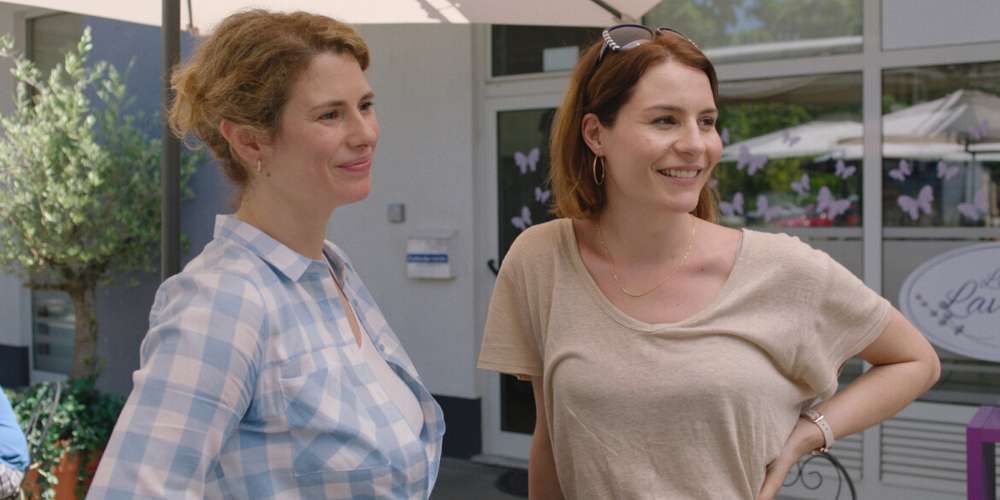
On one level, we watch the film in the way we do a Greek or Shakespearean drama, waiting for the axe to fall, not in titillation but in remorse, in judgement, with a code of ethics to gird our dismay, and on the other hand we watch it for clues as to where it all started and how it can end, but we are hard-pressed to find them beyond what we already know. So is the tragic irony the fact that we know more than the protagonist? Or is it one level deeper—that even when we know, we don’t act?
As an actress performing a character on edge in nearly every frame of the film, Tihana Lazović is stunning, and as the cinematographer, Danko Vučinović wields his hand-held camera to carry the tension in well-composed shots. What heightens the drama is the editing by Vanja Juranić herself, especially the sudden increases in the sound level for the sharply inserted, split-second subjective scenes that play like an accelerated human pulse when Tina is in danger.
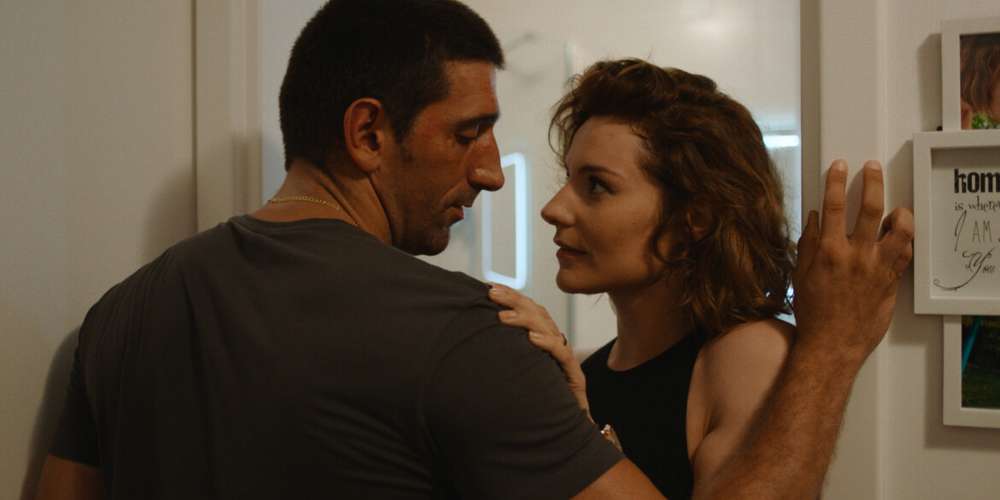
The most tragic irony of all, however, erupted outside of the film as it premiered at the 2023 Sarajevo Film Festival. That screening found Vanja Juranić dedicating Only When I Laugh to the victims of a real-life tragedy that had occurred the previous Friday in the northeastern Bosnian town of Gradačac. Nermin Sulejmanovic, a bodybuilder, murdered his former wife, Nizama Hećimović, and reportedly livestreamed the act on Instagram. She was his first victim. He then proceeded to kill a man and his son and injure three more people before he committed suicide.
Hećimović had requested a restraining order against her ex-husband, who had a criminal record, but her plea was denied by the local authorities on August 7th, and by August 11th, she was dead. Sulejmanovic began his livestream by telling viewers, “You will see what a live murder looks like.” The event and its broadcast were shocking enough, but perhaps more disquieting is the fact that, according to officials, more than 12,000 people viewed the slaying live on Instagram, and the video gained 126 “likes.”
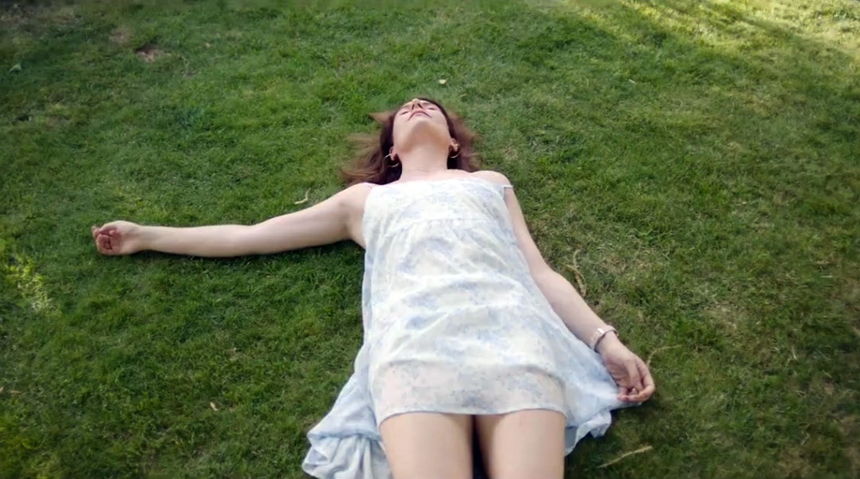
Thousands attended the funeral of the 38-year-old Nizama Hećimović and protestors filled the streets responding to the reference by filmmaker Vanja Juranić to a culture that blames female victims while enabling male perpetrators. The Sarajevo mayor declared a Day of Mourning and the festival canceled all screenings and events except for one—a panel called “Femicide in Film, Television, and New Media” with a public discussion. Still, Juranić remarked that it shouldn’t take a sudden tragedy for such dialogues to transpire at film festivals, adding, “While film can initiate change within an individual, it is only through continually discussing and unpacking cultural violence that we can create change.”
Earlier at the festival, when Vanja Juranić dedicated the screening of Only When I Laugh to the victims in Gradačac, she put it this way: “My film is a universal story about a woman trapped in a patriarchal environment. Despite being a victim, she is active and tries to change the situation, as happened in reality in Gradačac, and that’s why we want to dedicate this screening to the victims of this great tragedy.” Simultaneous protests covered Bosnia demanding action on the part of authorities against gender-based violence, with banners waving the words, “Silence is approval!” and “We will not live in fear.” How different was this spirit from that of the students and faculty alike on college campuses across the U.S. nine months later, protesting that this country has been facilitating a daily life of fear for survival on the part of women and their children as forced refugees in the Middle East? Invasion, occupation, violence, rape, murder—the warfare we live by, whether at the front or in the home—is hitting the screen at our film festivals, and that just might be playing a role in galvanizing action.


Excursion
Producers: Amra Bakšić Čamo, Adis Đapo; Director: Una Gunjak; Screenplay: Una Gunjak; Cinematography: Matthias Pilz; Editor: Clemence Diard; Production Design: Emina Kujundžić.
Cast: Asja Zara Lagumdžija, Nađa Spaho, Maja Izetbegović, Mediha Musliović, Izudin Bajrović.
93 min., Color, in Bosnian with English subtitles.
Only When I Laugh
Producers: Ana Grbac, Hrvoje Habeković, Damir Teresak, Nikolina Vučetić Zečević; Director: Vanja Juranić; Screenplay:Vanja Juranić, Elma Tataragić; Cinematography: Danko Vucinovic; Editor: Vanja Juranić; Production Design: Emina Kujundžić; Sound Design: Ivan Zelic; Music: Janja Loncar.
Cast: Tihana Lazović, Slavko Sobin, Jasna Đuričić, Elodie Paleka, Marina Redžepović, Nadine Mičić, Iva Jerković, Gloria Dubelj, Mirela Brekalo, Maruška Aras, Aneta Grabovac, Isadora Luque Akrap.
73 min., Color, In Croatian with English subtitles.